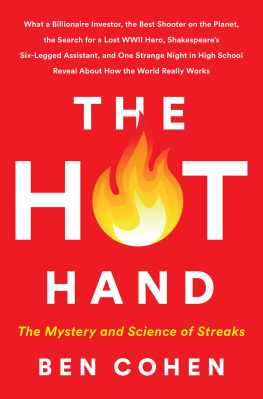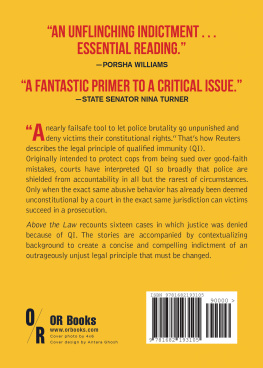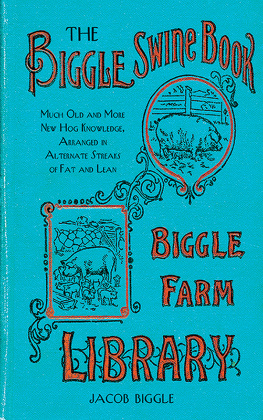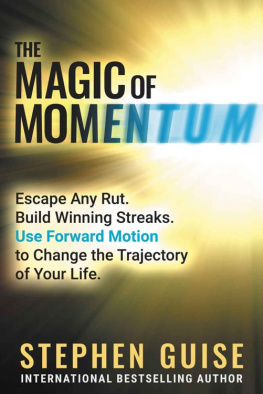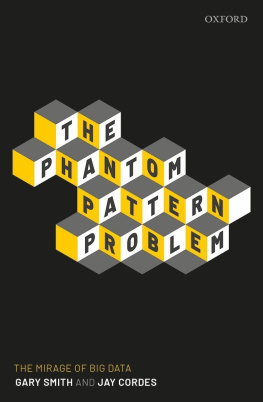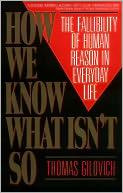Contents
For my parents, and for Stephanie
1.
One of the most enchanting moments of my life happened in a meaningless basketball game that nobody else would have any reason to remember. On that day I felt something magical that I have never forgotten. But it would take many years to figure out why. It was all because of a phenomenon that I did not understand, could not have explained, and was not supposed to be real. This book is the story of that seductive idea.
I went to a small high school that barely had enough kids for a varsity basketball team, let alone a junior varsity team. I was on the junior varsity. I started that game on the bench because I started every game on the bench. On this drab winter afternoon, our team walked into a cramped gym, and I went through my normal pregame routine of missing a whole lot more shots than I made. But exactly what happened next I cant really tell you. The sad truth is that I recall almost none of the other material details about this game. The final score, for example. I have no clue. I couldnt tell you which team won, either. The only certainty in my mind is that I must have removed my warm-ups at some point and walked onto the court, because what Im about to describe couldnt have happened otherwise. It hadnt happened to me before, and it hasnt happened to me since, which is why I still think about it all these years later.
I had the hot hand.
This odd series of events started when I checked into the game after halftime and managed to swish my first shot of the third quarter. I felt good. I swished my next shot. I felt better. I felt like I wanted to shoot again. It was at that point that I swished another shot, and it began to dawn on me that I was going to make any shot I dared to take.
As it turned out, contrary to every piece of prior evidence from my pathetic basketball career, the other team was coming to the same bizarre conclusion, and I found myself double-teamed when I touched the ball. I had tricked the other players into believing that I had talent. It was around this time when all the hours I had spent watching basketball on television came in useful. I thought about what someone who was actually good at shooting might do. The next time the ball was in my hands, I pretended I was one of those people. I faked a shot with a surprising amount of confidence for someone who never had a reason to attempt this move before. And it worked! The two defenders flew past me in what seemed like slow motion. Those poor suckers left me enough time to sip espresso before I sent the ball arcing toward the basket and swished one last shot. The whole thing was nothing short of astonishing. In one quarter of one game, I scored more points than I had in my entire life.
I quit playing basketball not long after that game. It was mostly because I was awful. But it was at least partly because I knew that I had already peaked. I would never again experience the rush of having the hot hand.
To have the hot hand is to achieve some elevated state of ability in which you feel briefly superhuman. There is no more pleasurable sensation for humans. Even if youre unfamiliar with basketball, youre probably familiar with this ethereal feeling. The hot hand exists in nearly every industry and touches nearly every person on earth.
What does it mean to have the hot hand in basketball? Its when youve made a few shots in a row, the hoop looks as big as a helipad, and you believe youre more likely to sink your next shot because youve made those previous shots. Its those glorious moments when you cant miss that stick with you. But there doesnt have to be a singular definition of the hot hand. You can simply tell when players are hot when you see them ablaze.
I know what that feels like. As much as I watched basketball, I usually found playing basketball to be as enjoyable as driving on the New Jersey Turnpike. But on that night, when I had the hot hand, I was ecstatic. There was no part of me that entertained the silly notion of passing the ball to a teammate. The buzzkill known as regression to the mean failed to cross my mind. I was going to shoot almost as soon as I touched the ball, and there was nothing that anybody could have done to stop me. I was hot. For this sublime period of time, I felt like I was defying probability. It would have been totally irrational if not for the fact that everyone on the court believed it was rational. They had seen it before. I had seen it, too. It just had never happened to me.
My brush with the hot hand lingered with me long after my basketball career was over. I was still thinking about it when I began doing what so many people do when they can no longer play sports: write about sports. Im the NBA reporter for the Wall Street Journal, and I have written hundreds of stories about basketball, taking advantage of my press credential to gain access to the inner sanctums of the leagues thirty teams. Its now my job to watch others catch the hot hand. But one day, while minding my own business and looking for story ideas by reading the latest academic research, I bumped into a ghost from my past. It turned out there were hundreds of scholarly papers about this notion of the hot hand.
I couldnt stop reading these studies. I read them more carefully than I read the lease to my apartment. I found them to be so fascinating because the hot hand was a scientific topic that I didnt have to read a textbook to comprehend. Or at least thats what I thought. I read one paper, then another, and then one more. I was on a hot streak of reading studies about hot streaks. I kept reading and reading until I had plowed through decades of work by economists, psychologists, and statisticians, and there was nothing left for me to read.
Only when I was done reading did I realize why so many people had written so many papers about the hot hand: because there was no such thing as the hot hand.
2.
Pine City, Minnesota, is an obscure speck on the map smack in the middle between Minneapolis and Duluth. I drove to this rural town on a wintry afternoon not too long ago to figure out how the small high school there had become the nations unlikeliest laboratory of sports innovation. I went to watch the Pine City Dragons hack basketball.
The coach of the Pine City High School basketball team was a history, government, politics, geography, and economics teacher with big eyes and a thick, dark beard named Kyle Allen. When he came to Pine City, the school was known for excellence in the arts, insomuch as it was known for anything at all. Most of his players also played musical instruments. Many of his players were in the choir that sang the national anthem before games. One of his players quit to perform in the winter musical. That player happened to be the teams star player. So there was almost nothing outwardly impressive about the Pine City Dragons.
But they won. They won a lot. They won a lot more than they had any right to win.
It was the way they won, though, that had me curious. I flew to Minnesota, drove to Pine City, and walked back into high school, where I found Allens players in a classroom inhaling the nutritional benefits of cheese curds and cookies. The same kids busy eating junk food would soon transform into a mighty basketball machine.
The first thing that Kyle Allen did when he moved to Pine City for his first coaching job was blow his entire budget. He was one of thousands of coaches who splurged on technology that created the sort of useful statistics that were previously available only to NBA teams. Pine Citys players soon had access to personalized metrics, customized video clips, and more numbers than they saw in their math classes. That profusion of data was the guiding force behind Allens coaching philosophy. Hed come to Pine City at a peculiar time in the history of sports. The seminal Michael Lewis book

